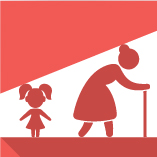
Why carers count

Demographic ageing is a significant challenge faced by all EU Member States.

80% of all care in Europe is currently provided by informal carers.

The estimated economic value of informal care in the EU is huge.
Against this backdrop, It is obvious that the importance of informal care to both care recipients and the sustainability of care systems in Europe can no longer be ignored. Yet, many informal carers still do not have the opportunity to choose freely whether they want to be a carer and to what extent they want to be involved in caring. Moreover, when not adequately supported, caring can have damaging consequences on the health and well-being, social inclusion, education and employment of carers themselves – thereby creating a vicious circle.
Over the last few years, much has been achieved in taking forward the carers’ agenda at international, EU and – to some extent – national and regional level. But policy developments of relevance for carers are often implemented in a fragmented manner and consequently do not always result in real improvements in carer support and empowerment.
What can be done to improve the situation?
This manifesto aims to define the key steps required to develop carer-friendly societies in Europe.
Good-quality and affordable long-term care should primarily rely on well-resourced and well-organised professional (i.e. formal) services, in particular home-care and community-based services. Investing in these sectors should therefore be seen as a key element in the achievement of our mission.
Having said that, given the prominent role of informal carers, much more could and should be done to recognise their contribution, to connect the dots between existing EU, national and regional policy initiatives and to trigger new policy developments to support and empower carers across Europe:
What YOU can do to support carers
As a (future) Member of the European Parliament, we encourage you to do everything in your power as part of your mandate to help promote and implement Eurocarers’ EU Strategy on Carers, which further details the 10 steps mentioned above. We also warmly invite you to join the European Parliament Informal Carers Interest Group which have coordinated since its inception in 2007.
The Group’s mission is to:
- Provide a forum to address EU (policy) developments and their impact on carers and their interests; and
- Initiate policy action: to take initiatives that can lead to/influence EU policy initiatives, i.e. Written Questions, amending policy proposals, discussions with the relevant policy makers, host events/hearings on carers and their interests.
Its main current focus areas include:
- Caring as a barrier to social inclusion and employment;
- Young carers;
- Informal care in the future of care and caring in Europe.
Over the last 12 years some 35 meetings have taken place, attended by relevant Commission and Council representatives as well as concerned stakeholder organisations, resulting in greater awareness of carers and their issues as well as concrete policy action.
Should you want to support Eurocarers’ mission, help implement this manifesto and contribute to the work of the EP Informal Carers Interest Group, please fill in the form below:
Last Updated on May 14, 2019


